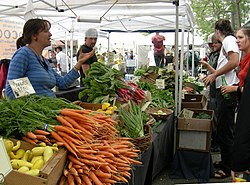Draft:Original research/Economics

Economics is the study of the value system and rewards of a particular society.
Business
A business is a legally recognized organizational entity designed to provide goods or services.[1]
Def.
- a "person's occupation, work, or trade",[2]
- an activity that someone is engaged in,
- work that has to be done or matters that have to be attended to, or
- the practice of making one's living by engaging in commerce
is called a business.
Money

Def. a current medium of exchange in the form of coins and banknotes is called money.
Trade
Def. buying "and selling of goods and services on a market"[3] or an "instance of bartering items in exchange for one another"[4] is called trade.
Theoretical economics
Def. "a science which studies human behaviour as a relationship between ends and scarce means which have alternative uses"[5] is called economics.
Alternately,
Def. a science that studies the production, consumption, and transfer of wealth is called economics.
Def. the "study of resource allocation, distribution and consumption; of capital and investment; and of management of the factors of production"[6] is called economics.
Globalization
Globalization involves goods and services, and the economic resources of capital, technology, and data.[7] The steam locomotive, steamship, jet engine, and container ships are some of the advances in the means of transport while the rise of the telegraph and its modern offspring, the Internet and mobile phones show development in telecommunications infrastructure. All of these improvements have been major factors in globalization and have generated further interdependence of economic and cultural activities.[8][9][10]
Hypotheses
- The economics of entrepreneurship favors an open market.
Quotes
"By virtue of exchange, one man's prosperity is beneficial to all others." -Frédéric Bastiat
See also
- Adventureship (15th century) (13 kB) (13 September 2019)
- Agriculture (Middle Bronze Age) (15 kB) (21 May 2019)
- Anthropology (Aftonian, 540 ka) (30 kB)
- Attribution and copyright (33 kB) (19 October 2019)
- Attribution and copyright dominant group
- Broader impact dominant group
- Attribution and copyright liability (8 kB) (23 July 2019)
- Attribution and copyright national treatment (3 kB) (23 July 2019)
- Classics (Ancient history) (66 kB) (23 July 2019)
- Cryptoeconomics (3 kB) (26 October 2019)
- Culture (Aftonian) (9 kB) (24 May 2019)
- Dates (Hadean) (173 kB)
- Dominant group culture (Recent history) (19 kB)
- Econometrics (5 kB) (29 November 2018)
- Economics () ()
- Funding (9 kB) (28 May 2019)
- Gift economy (14 kB) (2 July 2019)
- History (Hadean) (163 kB) (3 August 2019)
- Hominins (Miocene) (25 kB)
- Horticulture (3 kB) (24 July 2018)
- Humanistic methods (15 kB) (7 August 2019)
- Humanities (40 kB) (26 July 2019)
- Intellectual property (37 kB) (13 January 2019)
- Journalism (24 kB) (24 July 2019)
- Law dominant group
- Laws (11 kB) (13 August 2019)
- Libyan history (Oligocene) (29 kB) (13 August 2019)
- Literature (37 kB) (23 June 2019)
- Macroeconomics (1 kB) (7 March 2009)
- Metadefinitions (36 kB) (14 August 2019)
- Middle Ages (-10th century) (108 kB)
- Monopolistic practices (15th century) (23 kB) (31 August 2019)
- Microeconomics (3 kB) (11 May 2019)
- Open design vertical farm (< 1 kB) (29 September 2009)
- School:Economics
References
- ↑ Wikipedia: Business (disambiguation)
- ↑ business. San Francisco, California: Wikimedia Foundation, Inc. 11 April 2015. https://en.wiktionary.org/wiki/business. Retrieved 2015-05-18.
- ↑ 194.100.213.252 (27 January 2012). trade. San Francisco, California: Wikimedia Foundation, Inc. https://en.wiktionary.org/wiki/trade. Retrieved 2015-05-18.
- ↑ Msh210 (26 May 2011). trade. San Francisco, California: Wikimedia Foundation, Inc. https://en.wiktionary.org/wiki/trade. Retrieved 2015-05-18.
- ↑ Lionel Robbins (1932). An Essay on the Nature and Significance of Economic Science. London: Macmillan. https://books.google.com/books?id=nySoIkOgWQ4C&printsec=find&pg=PA15#v=onepage&q&f=false.
- ↑ Dan Polansky (6 July 2008). "economics". San Francisco, California: Wikimedia Foundation, Inc. Retrieved 25 May 2019.
{{cite web}}:|author=has generic name (help) - ↑ Albrow, Martin; King, Elizabeth (1990). Globalization, knowledge, and society: readings from International sociology. Sage Publications. ISBN 978-0-8039-8323-6. https://books.google.com/books?id=lfe1AAAAIAAJ.
- ↑ Imagining the Internet, In: History of Information Technologies. Elon University School of Communications. http://www.elon.edu/e-web/predictions/150/1830.xhtml. Retrieved 17 August 2009.
- ↑ Stever, H. Guyford (1972). "Science, Systems, and Society". Journal of Cybernetics 2 (3): 1–3. doi:10.1080/01969727208542909.
- ↑ Wolf, Martin (2014). "Shaping Globalization". Finance & Development 51 (3): 22–25. http://www.imf.org/external/pubs/ft/fandd/2014/09/pdf/wolf.pdf.
External links
- Core Econ is a freely-available economics textbook from the United Kingdom
|
Learn more about Economics |
- CS1 errors: generic name
- Agriculture/Lectures
- Anthropology/Lectures
- Aviation/Lectures
- Business/Lectures
- Communication/Lectures
- Cultures/Lectures
- Dominant group/Lectures
- Ecology/Lectures
- Economics/Lectures
- Geography/Lectures
- Humanities/Lectures
- Incomes/Lectures
- Laws/Lectures
- Medicine/Lectures
- Political sciences/Lectures
- Psychology/Lectures